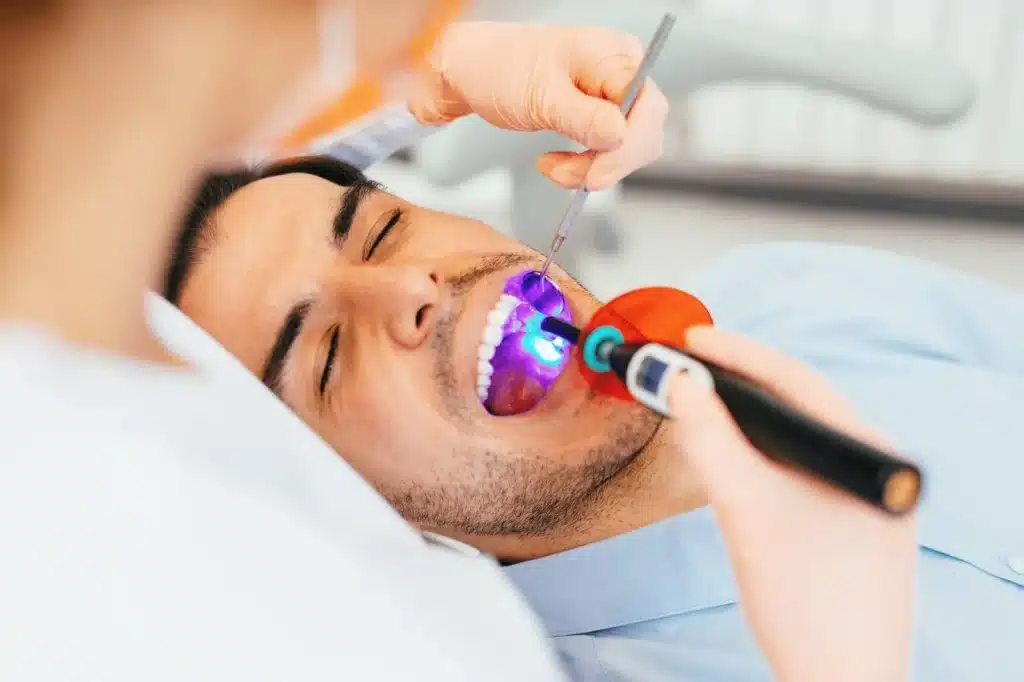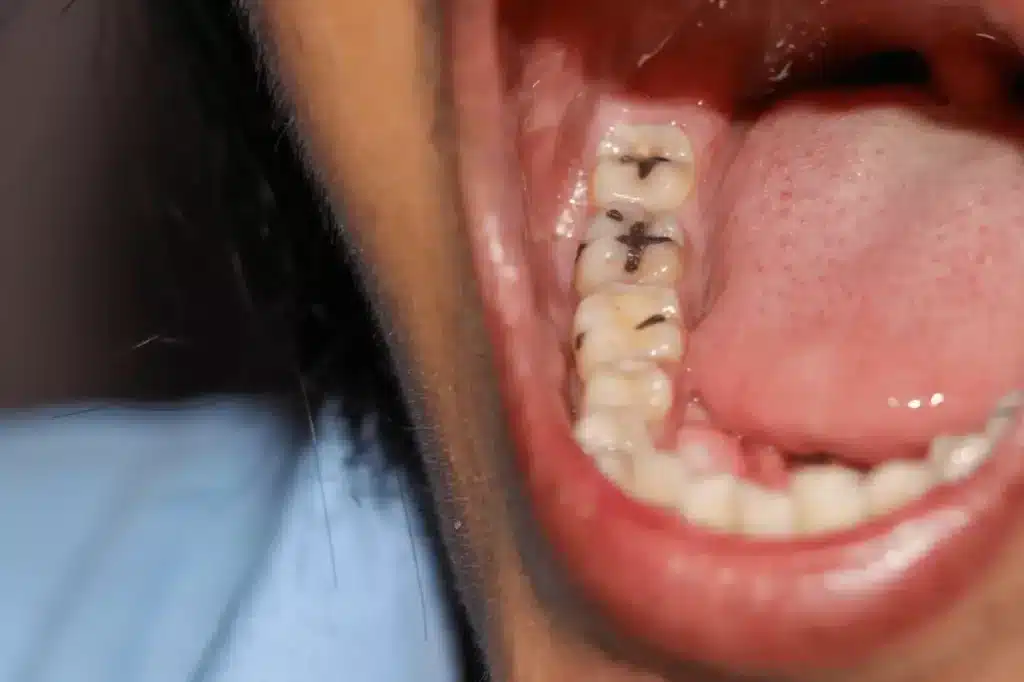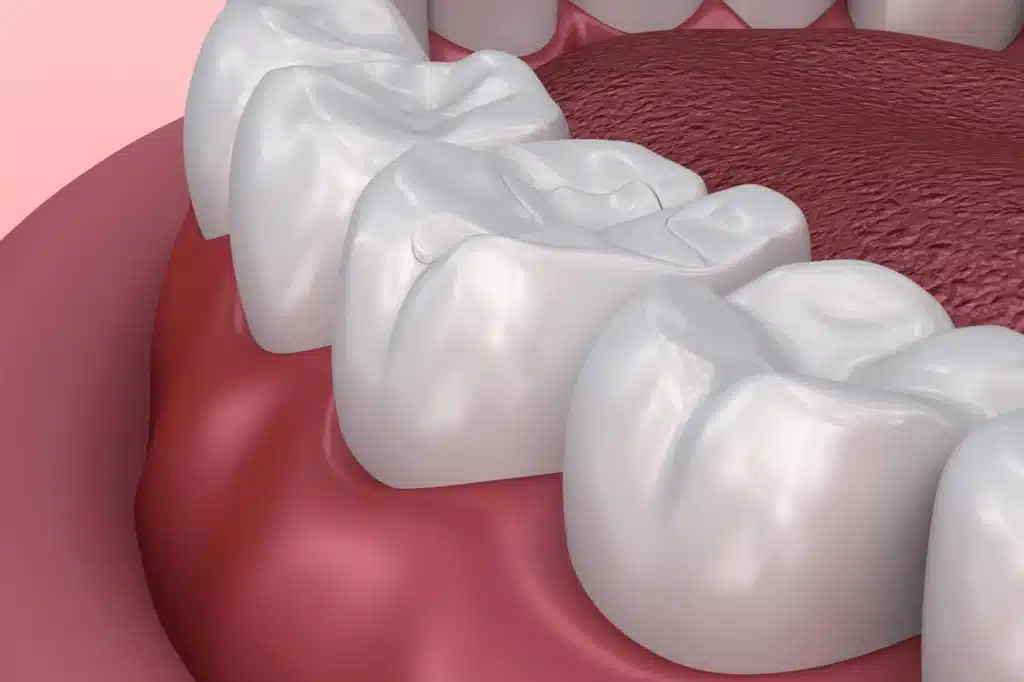Food particles can get stuck on the chewing surface of your teeth and cause cavities. Dental sealants prevent your teeth from cavities. Read more.
Dental Sealants
Dental sealants are thin, liquid shields placed on your molars. Dentists paint sealants on the chewing surfaces of your back teeth, called premolars and molars. After applying, the dentist uses a special process to make the sealant hard and protective. It keeps your teeth safe from harmful bacteria that can cause cavities.
Materials Used
Sealants can be made from different materials, like:
- Special resins (which can be from plants or created synthetically).
- Glass ionomers (a mix of glass powder and a water-soluble acid) that are safe for medical use.
Importance of Sealants
Dentists use sealants to shield your teeth from nasty bacteria that can make you sick. Your back teeth have these deep grooves that help when you chew and grind food. Sometimes, food and bacteria get stuck in these grooves, leading to cavities over time. Sealants act like a protective layer, so those harmful bacteria can’t get there.
Sealants are Recommended For
Kids and teenagers are the usual candidates for dental sealants. Even adults who don’t have tooth decay or fillings in their molars can benefit from them. In general, anyone at risk of getting cavities in their back teeth should consider getting sealants.
Sealants are essential for children’s molars or premolars. This way, the sealants can keep their teeth safe during the years when they’re most likely to get cavities (usually from ages 6 to 14).
Sometimes, it’s also a good idea to use dental sealants on baby teeth. For instance, if your child has baby teeth with deep grooves, sealants can protect those areas. Because baby teeth are essential for holding space for adult teeth, keeping them healthy is crucial so they don’t fall out too early.
How Common Are Sealants?
Dental sealants are among the most common ways to prevent dental problems today. In the U.S., about 42% of kids aged 6 to 11 and 48% of teenagers aged 12 to 19 have dental sealants on their adult teeth.
What to Do Before Getting Sealants?
You don’t need to do anything special to prepare for dental sealants. Your dentist or hygienist will take care of it during a regular dental visit.
Before putting on the sealants, they’ll ensure your teeth are clean. This way, they can prevent bacteria from getting trapped between the sealant and your teeth.
Procedure
The process of dental sealants is comfortable and painless. It only takes a few minutes for your dentist or hygienist to put the sealant on each tooth. Here’s what they’ll do:
- Clean your teeth well.
- Dry your teeth and put a small piece of cotton gauze to keep your teeth dry.
- Brush a bit of a special liquid on your teeth’ chewing surfaces to make them a little rough so the sealant sticks well.
- Wash and dry your teeth.
- Paint the sealant onto your tooth’s outer layer, which sticks right to it.
- Shine a special light on the sealant to make it harden.

Recovery Time
After getting dental sealants, you won’t need any recovery time. You can simply return to work right away.
Benefits of Sealants
- Sealants cover the tricky-to-reach spots on your teeth, keeping them safe from cavities by blocking out bacteria, plaque, and food bits.

Disadvantages of Sealants
- Sealants don’t last forever and need replacement every five years.
- You can’t use sealants with cavities or fillings on teeth.
- Sealants can trap bacteria and lead to cavities if not put on correctly.
When to See the Dentist
It’s a good idea to visit your dentist for regular check-ups at least every six months. Your dentist will examine your teeth and gums to see how they’re doing and recommend any needed treatments. This is also a great time to ask your dentist about sealants to help keep your mouth healthy.
Moreover, suppose you notice any changes in your oral health, like toothaches, gum pain, bleeding gums, bad breath, or anything else that worries you. In that case, scheduling an appointment with your dentist is essential.
Conclusion
Dental sealants protect your teeth from harmful bacteria. The food particles can stay stuck on the chewing surface and cause cavities. Always consult your dentist before getting dental sealants. Contact Dentalsway for more information. We are here to help you achieve a beautiful and healthy smile.


